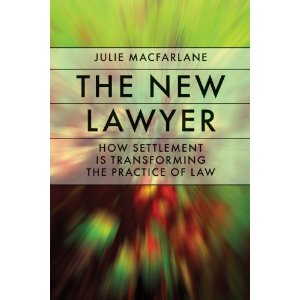
Lawyers, law professors and law students are reading Julie Macfarlane’s “The New Lawyer” (already in its 4th printing) because it resonates with their own sense of change in the profession of law. As the business world and personal clients increasingly seek pragmatic problem-solving, rather than protracted adversarial procedures, the “new lawyer” must work in a different way with clients - looking for opportunities to negotiate, evaluating many possible dispute resolution processes, and working closely with clients to plan and implement strategies that will maximize their chances of the best possible settlement as a realistic alternative to trial.
The new lawyer's skills go beyond court battles to encompass negotiation, mediation, collaborative practice and restorative justice. In The New Lawyer, Julie Macfarlane explores the evolving role of practitioners, articulating legal and ethical complexities in a variety of contexts drawn from Canadian and American legal literature as well as from her own empirical research. The result is a thought-provoking exploration of the increasing impact of alternative, consensus-seeking strategies on the lawyer-client relationship, as well as on the legal system itself.
To get order info, go to Ordering Informationor call 1-800-668-0821.
What leaders in the profession are saying about The New Lawyer:
“The legal profession needs a wake-up call, and The New Lawyer resoundingly provides it. Macfarlane persuasively critiques the outmoded habits of the profession and lays the foundation for the new settlement-oriented, problem-solving approach to lawyering.”
David Hoffman, Chair, Collaborative Law Committee of the American Bar Association Section of Dispute Resolution
"This superb book should be required reading for all U.S. law students. It's wisdom offers guidance and inspiration to the new generation of lawyers, and tremendous hope for the legal profession."
John D. Feerick, former Dean, Fordham Law School
“The New Lawyer presents the most compelling case for the legal profession to change to come along in decades. Macfarlane convincingly replaces the old paradigm of the lawyer as warrior with a new perspective on what zealous advocacy truly is to clients – solving a problem through conflict resolution advocacy.”
Kathy Bryan, President and CEO, CPR: International Institute for Conflict Prevention & Resolution
“A provocative and hopeful vision of the ‘new lawyer’ who has chosen to embrace a more inclusive calling ... With Macfarlane’s guidance, it may be possible to reclaim the pragmatic nobility of the legal profession.”
Nancy A. Welsh, Professor of Law, Dickinson School of Law, Pennsylvania State University
“Building on her cutting edge research on lawyering, with The New Lawyer Professor Macfarlane has established her place as a leading thinker in the areas of legal access, negotiation and dispute resolution. With an easy to read style breaking down complex and nuanced issues and the use of interviews with practicing lawyers, Macfarlane eloquently educates the reader on the problems facing legal services and proposes workable solutions for the future. This book should be required reading for law students, practicing lawyers, and policy makers in legal education and the organized bar.”
Forrest (Woody) Mosten, Collaborative Lawyer and Mediator ; Adjunct Professor UCLA School of Law; Author, Collaborative Divorce Handbook (2009), Mediation Career Guide (2001), Unbundling Legal Services (2000) and Complete Guide to Mediation (1997)
“This is an important book. Recognizing that the traditional ‘client warrior’ model of lawyering no longer fits the needs of clients, Macfarlane argues that lawyers must change if they are to survive. But change does not mean an abandonment of the skills that have defined the profession; instead Macfarlane argues persuasively that the ‘new lawyer’ must evolve by adding new dimensions to their traditional competencies and roles. As someone actively involved in teaching legal ethics to law students, I find the analysis both welcome and overdue.”
Patrick J. Monahan, Dean, Osgoode Hall Law School
